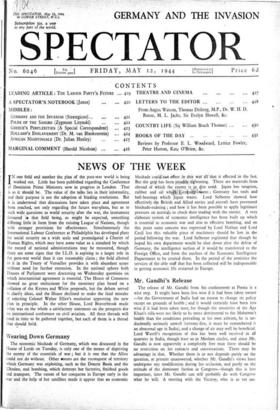I N one field and another the plan of the post-war
world is being worked out. Little has been published regarding the Conference of Dominion Prime Ministers now in progress in London. That
NEWS OF THE WEEK
is as it should be. The value of the talks lies in their informality, and their purpose is not the adoption of binding resolutions. But it is understood that discussions have taken place and agreement been reached, not only regarding the future war-plans, but as to such wide questions as world security after the war, the instrument favoured in that field being, as might be expected, something differing little in form from the existing League of Nations, though with stronger provisions for effectiveness. Simultaneously the International Labour Conference at Philadelphia has developed plans for social security on a wide scale and promulgated a Charter of Human Rights, which may have some value as a standard by which the record of national administrations may be measured, though there are some signs that the I.L.O. is aspiring to a larger role in the post-war world than it can reasonably claim ; the field allotted to it in the Treaty of Versailles provides it with abundant scope without need for further extension. In the national sphere both Houses of Parliament were discussing on Wednesday questions on which international agreement is essential. The House of Commons showed no great enthusiasm for the monetary plan based on a collation of the Keynes and White proposals, but the debate served to clarify ideas, and the House declined to make the fatal mistake of rejecting Colonel Walter Elliot's resolution approving the new plan in principle. In the other House, Lord Beaverbrook made what was on the whole a satisfactory statement on the prospects for an international conference on civil aviation. All these threads will need in rime to be gathered together, but each of them is a thread that should hol.d.


























